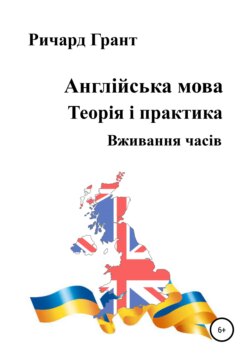Читать книгу Англійська мова. Теорія і практика. Вживання часів - Ричард Грант - Страница 4
Рiзниця мiж The Past Simple i The Past Perfect
ОглавлениеPast Simple використовується, коли дії відбуваються в хронологічному порядку, а Past Perfect – коли потрібно показати, яка дія відбулося першою, раніше інших дій.
He started the car, turned the radio on and fastened the seat belt. – Він завів машину, включив радіо і пристебнув ремінь безпеки.
Дії описуються в хронологічному порядку: спочатку він завів машину, потім включив радіо і пристебнув ремінь безпеки.
He started the car, turned the radio on, but before he had fastened the seat belt. – Він завів машину, включив радіо, але перед цим пристебнув ремінь безпеки.
Дії описуються не в хронологічному порядку: спочатку він пристебнув ремінь безпеки, а потім завів машину і включив радіо.
Часто в подібних реченнях використовується слово when (коли).
When I got home, my son took my car. – Коли я прийшов додому, мій син взяв у мене машину.
When I got home, I found that my son had taken my car. – Коли я прийшов додому, я виявив, що мій син взяв мою машину.
Якщо з контексту зрозуміло, що одна дія відбулася раніше іншої, можна використовувати як Past Perfect, так i Past Simple. Часто зрозуміти контекст і черговість подій допомагають наступні слова-маркери: before (перед тим як, до того як), after (після того як), first (спершу, спочатку), as soon as (відразу після того як; як тільки), earlier (раніше) i iншi.
I didn’t worry about speaking in front of so many people. I gave public speeches earlier. – Я не переживав щодо виступу перед великою кількістю людей. Я і раніше виступав на публіці.
I didn’t worry about speaking in front of so many people. I had given public speeches earlier. – Я не переживав щодо виступу перед великою кількістю людей. Я і раніше виступав на публіці.
Вправа 38
Розкрийте дужки, вживаючи дієслова у Past Simple або Past Perfect.
1. When the police … (to arrive), we already … (to catch) the thief. 2. Tom (to return) from the cinema at five o’clock. 3. By two o’clock the teacher (to examine) all the students. 4. Jack … (to finish) the test before the bell … (to ring). 5. Tom (to return) from the cinema by five o’clock. 6. On my way to school I (to remember) that I (to leave) my report at home. 7. When Anna … (to come) to say good-night, her children already … (to fall) asleep. 8. I (to finish) my homework at seven o’clock. 9. My friends (to be) glad to hear that I (to pass) all the exams successfully. 10. Scott already … (to prepare) the dinner when her husband … (to get) home from work. 11. I (to finish) my homework by seven o’clock. 12. Poor Oliver (to lie) unconscious on the spot where Sikes (to leave) him. 13. When Brad and Susan … (to get) married, they … (to know) each other for 3 years. 14. He (to think) that he (to lose) the money. 15. Mary (to tell) us that she (to cook) a good dinner.
Вправа 39
Розкрийте дужки, вживаючи дієслова у Past Simple або Past Perfect.
1. He (to open) his eyes, (to look) around and (to try) to remember what (to happen) to him. 2. She … (not to enjoy) the film because she … (to read) the book before. 3. Ann (to tell) me that she (to see) an interesting film. 4. All the passengers (to see) at once that the old man (to travel) a great deal in his life. 5. Our apartment … (to be) in a mess because I … (to have) a birthday party the night before. 6. When I (to come) home, mother already (to cook) dinner. 7. By the time we (to come) to see him, he (to return) home. 8. We … (not to go) to a restaurant because we … (to spend) all our money on clothes. 9. When father (to return) from work, we already (to do) our homework. 10. During the holidays my friend (to visit) the village where he (to live) in his childhood. 11. Mary … (can’t go skating) after she … (to break) her leg. 12. When the teacher (to enter) the classroom, the pupils already (to open) their books. 13. When they (to enter) the hall, the performance already (to begin). 14. Larry … (to be) late because he … (to get) stuck in a traffic jam. 15. Kate (to give) me the book which she (to buy) the day before. 16. Yesterday I (to find) the book which I (to lose) in summer.
Вправа 40
Розкрийте дужки, вживаючи дієслова у Past Simple або Past Perfect.
1. When I came home, my mother (to tell) me that she (to receive) a letter from grandfather. 2. Nick (to show) the teacher the picture which he (to draw). 3. Where you (to work) before you (to go) to university? 4. The boy (to give) the goats the grass which he (to bring) from the field. 5. He (to know) French before he (to visit) France. 6. Mother (to see) that Nick (not to wash) his hands. 7. Lanny (to say) that he (to get) his education in Cape Town. 8. The teacher (to understand) that Lena (not to do) her homework. 9. The boy (to want) to act the main part in the play because he (to organize) the theatre. 10. I (to know) that my friend (not yet to come). 11. Lanny (not to know) who (to attack) him in the darkness. 12. When I (to wake) up yesterday, father already (to go) to work. 13. The girl (to be) glad that she (to find) a seat near the window. 14. Nick (to think) that his father (not yet to come) home. 15. Suddenly he (to remember) that he (not to ring) her up in the morning. 16. When we (to come) to the station, the train already (to leave).
